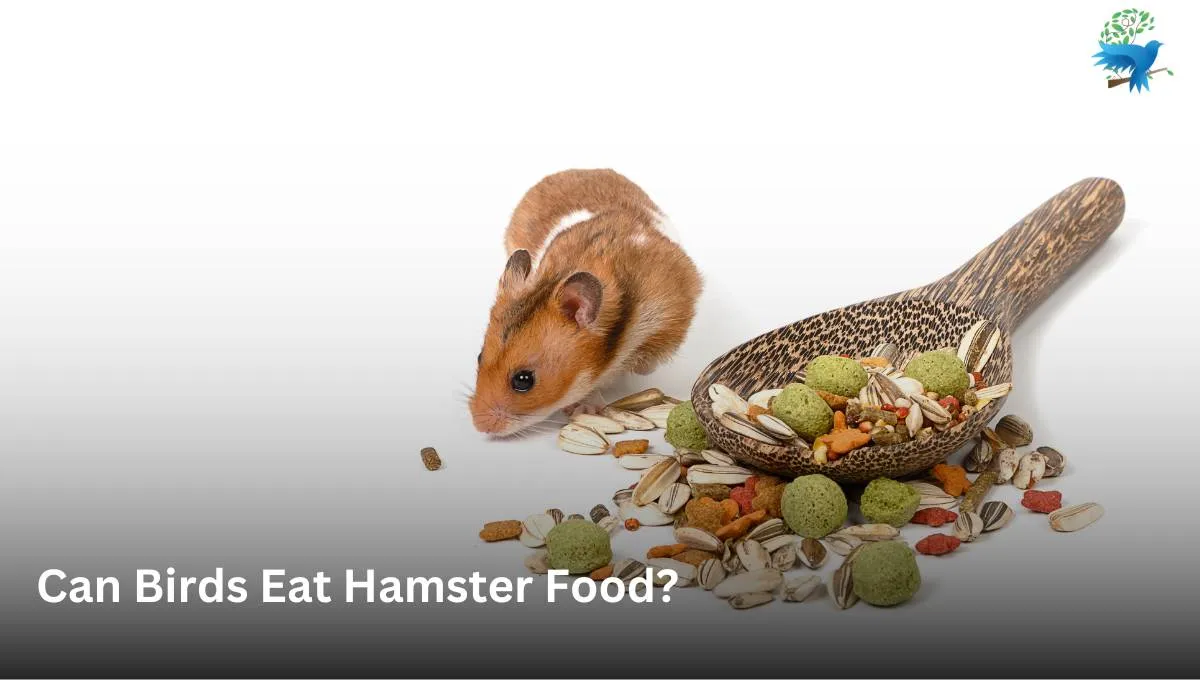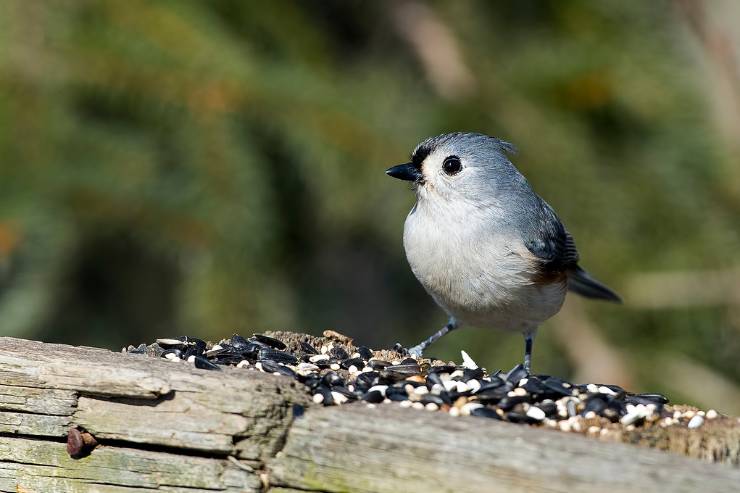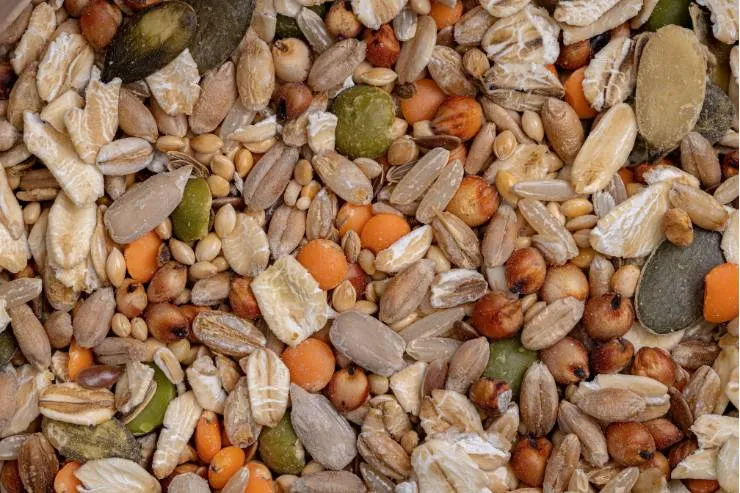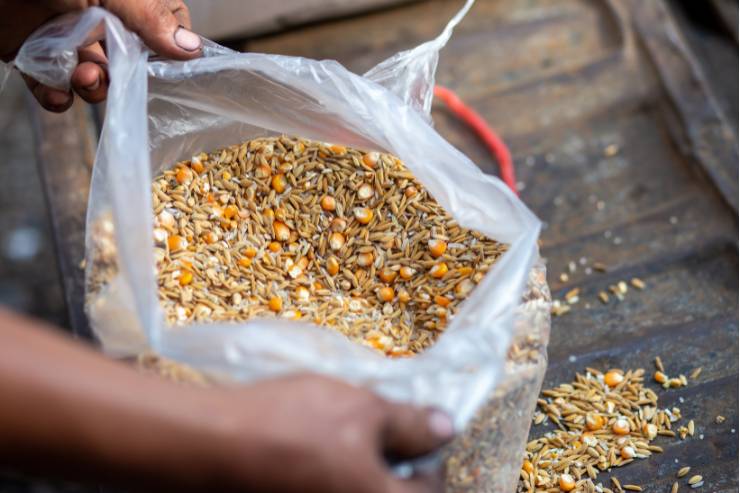Can Birds Eat Hamster Food?

You may wonder if birds can consume hamster food. Yes, birds can eat hamster food, but it relies entirely on the sort of hamster food provided.
Birds can eat hamster food because it often contains seeds, grains, and nuts, which are natural components of many bird diets.
However, the suitability of hamster food for birds depends on the specific ingredients within the feed.

It’s essential to carefully assess the nutritional content and avoid additives, preservatives, or artificial flavors that may harm avian health.
Furthermore, proper nutrition is paramount for birds’ health and well-being. As we all know, a balanced diet is crucial for birds just as much as it is for humans.
The food is rich in essential nutrients, vitamins, and minerals, supports various physiological functions, and helps prevent health issues such as malnutrition and obesity in birds.
Birds have particular dietary requirements based on their species, size, age, and activity level. Providing diverse foods, including seeds, fruits, vegetables, and proteins, ensures that birds receive all the necessary nutrients for optimal health and vitality.
So, without delay, let’s move forward and learn in detail about Hamster food and whether birds can have hamster food.
Hamster Food Composition
Hamsters are omnivorous, eating both plant and animal foods. Their omnivorous animal food consists of seeds, grains, insects, and sometimes small animals such as insects and worms.
If hamsters are kept as pets, they are also given a packaged hamster meal blend supplemented with fresh fruits and vegetables.
To suit their dietary requirements, hamster food must be well-balanced in terms of proteins, lipids, and carbohydrates.
Typical Ingredients In Hamster Food
Common ingredients found in commercial hamster food blends include:
- Seeds: Such as sunflower seeds, pumpkin seeds, sesame seeds, and millet.
- Grains: Such as oats, barley, wheat, and corn.
- Dried fruits and vegetables: Carrots, apples, peas, and bananas.
- Nuts: Such as peanuts and almonds
- Protein sources: Such as dried mealworms and turkeys
Additionally, fresh fruits, vegetables, and occasional treats like plain cooked chicken or boiled eggs are also included in the hamster diet.
Comparison to Bird Seed/Nutritional Needs
Bird Seed/Nutritional Needs
Birds require a balanced diet that includes protein, carbohydrates, and fats.
Their natural diet consists of various foods: seeds, berries, fruits, insects, eggs, small mammals, fish, buds, larvae, aquatic invertebrates, nuts, vegetation, grains, carrion, and even garbage.
A nutritious diet for birds typically consists of two main components. Firstly, a high-quality pelleted diet that provides essential nutrients, vitamins, and minerals.
These pellets generally contain around (50-75%) a balanced blend of proteins, carbohydrates, and fats to support bird health.
Secondly, fresh vegetables and fruits should comprise the remaining portion of their diet (around 25-50%). These offer additional vitamins, minerals, and fibre.
Hamsters Seed/Nutritional Needs
The nutritional value of hamster chow is developed to meet the unique requirements of these little animals.
Typically, hamster meals contain 12-24% protein, with greater levels of 18-40% advised for pregnant or young hamsters to promote growth.

Fat content ranges from 3-6%, although a slightly higher fat content of 7-9% is recommended for pregnant or nursing hamsters.
Fiber, crucial for digestion, should comprise 6-15% of their diet and can be obtained from fruits, vegetables, and whole grains.
Potential Benefits of Hamster Food for Birds
Hamsters’ food can benefit avian health when given to them occasionally.
Hamster seed blends a variety of seeds and nuts, which are safe and nutritious food sources for birds’ health and do not offer the risk of allergic responses.
Food consumed by hamsters should be given in moderation, and a varied selection of fresh vegetables and fruits should be provided to provide adequate nutrition for birds.
Risks Associated with Birds Eating Hamster Food
Birds eating hamster chow may experience malnutrition, digestive problems, and likely toxicity from substances that are not suited for bird feeding.
A. Nutritional Deficiencies
Birds who eat hamster chow are in danger of developing nutritional deficits due to the dietary gaps between birds and rodents.
While hamster food may provide appropriate nutrition for hamsters, it may not offer vital components required for bird health.
For example, a hamster’s diet may lack specific vitamins, minerals, or amino acids that birds need, such as vitamin A, calcium, or lysine.
Over time, this vitamin imbalance might result in shortages that weaken the bird’s immune system, impair its growth and development, or develop other health issues.
B. Health Complications
Birds may develop health difficulties such as obesity, cardiovascular problems, or metabolic abnormalities due to hamster food’s high fat and carbohydrate content.
Furthermore, insufficient critical nutrients such as vitamins and minerals can weaken a bird’s immune system, making it more vulnerable to illnesses and disorders.
These health issues can negatively impact the bird’s general well-being and lifespan.
C. Digestive Issues
Hamster food frequently contains seeds, grains, and pellets difficult for birds to digest. The rough outer shells of some seeds and the massive size of certain grains can cause obstructions or discomfort in a bird’s digestive tract.
Furthermore, hamster food’s high fat or protein content may overburden a bird’s digestive tract, resulting in diarrhea, vomiting, or gastrointestinal discomfort.
Birds’ habitual ingestion of hamster chow can upset their digestive balance, compromising their overall health and well-being.
Thus, bird owners must supply an avian-specific diet to avoid stomach issues.
Factors to Consider
Bird Species and Size
When considering the dangers of birds consuming hamster chow, it is critical to consider the type and size of the bird.
Different bird species have diverse nutritional needs and digestive skills. Larger birds may tolerate occasional hamster meal consumption more than smaller species.
Furthermore, certain bird species may have more muscular digestive systems that can manage a variety of diets.
However, regardless of species, providing a balanced meal adapted to the bird’s nutritional demands is critical for its overall health and well-being.
Frequency of Feeding Hamster Food
Another important consideration is how frequently hamster food is provided to birds.
While occasional consumption is not a substantial risk, regular or excessive feeding of hamster chow can result in various health problems, including nutritional deficiencies, digestive troubles, and obesity.

To suit the bird’s dietary needs, hamster chow provides a variety of fresh fruits, vegetables, seeds, pellets, and other avian-specific meals instead.
Monitoring the bird’s overall health and changing its diet can help avoid potential difficulties when giving hamsters food.
Alternative Options for Bird Nutrition
A. High-Quality Birdseed Mixes
Birdseeds for birds of all kinds provide various seeds, grains, and nuts adapted to their nutritional requirements.
These mixtures frequently comprise a well-balanced mix of carbohydrates, lipids, proteins, vitamins, and minerals necessary for bird health.
High-quality birdseed mixes can nourish birds while also satisfying their natural scavenging impulses.
B. Fresh Fruits and Vegetables
Fresh fruits and vegetables are a great way to supplement a bird’s diet with critical vitamins, minerals, and antioxidants.
Leafy greens, carrots, apples, berries, and oranges can supply a variety of nutrients while also adding texture and flavor.
However, it is critical to research which fruits and vegetables are safe and appropriate for each bird species, as some may be toxic or have negative consequences.
C. Pelleted Bird Food
Pelleted bird food is a practical and nutritionally balanced solution for bird owners looking to provide their feathered companions with a comprehensive diet.
These pellets are designed to fulfil the nutritional needs of various bird species.
Pelleted bird food can help guarantee that birds obtain consistent nutrition while avoiding the possibility of selective feeding, which occurs when birds ingest only particular chosen items from a mixed diet.
Conclusion
To summarize, while birds can occasionally take hamster food, it is critical to understand the potential hazards involved with this activity.
Hamster food may lack particular elements required for avian health, resulting in nutritional deficits and various health issues.
Digestive difficulties may emerge due to birds’ difficulty processing specific components of hamster food.
Alternative options for bird nutrition include high-quality birdseed mixes, fresh fruits and vegetables, and pelleted bird food.
By prioritizing a varied and species-appropriate diet, bird owners can safeguard their feathered friends’ health and well-being.
Frequently Asked Question
Can birds safely eat hamster food?
While birds can occasionally eat hamster food, they must consider its nutritional value and potential hazards. Hamster meals often include seeds, grains, and nuts, standard components of many bird diets. However, it is critical to check that the food does not contain additives, preservatives, or artificial tastes that could compromise avian health.
What are additional options for bird nutrition?
Bird nutrition alternatives include high-quality bird seed mixes, fresh fruits and vegetables, and pelleted bird food. These options provide birds with safer and more balanced meals, ensuring they acquire essential nutrients without the hazards associated with hamster meal eating.
Can every bird species eat hamster food?
While some bird species may tolerate occasional hamster munch better than others, examining each species’ food needs and digestive capacities is critical. Larger birds may be more adapted to hamster food than smaller species, but a varied and species-appropriate diet is critical for maximum health regardless of size.






